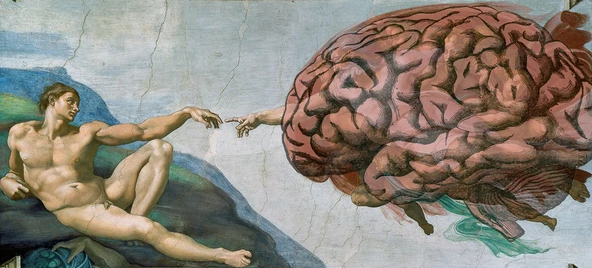The Moral Philosophy of Bitcoin
| If you find WORDS helpful, Bitcoin donations are unnecessary but appreciated. Our goal is to spread and preserve Bitcoin writings for future generations. Read more. | Make a Donation |
The Moral Philosophy of Bitcoin
Virtuous Habits and the Shameless Bitcoiner
By Prateek Goorha
Posted March 7, 2020
 The Mind Behind the Memes
The Mind Behind the Memes
I. Bitcoin-ism
Bitcoin has provided us with a veritable catalog of concepts and ideas. As the essential merits of its framework have become more broadly understood; as ever more services have been developed to leverage its mechanisms for broader objectives; as its ecosystem has matured and become more varied and complex, discourse on Bitcoin has flourished.
Beyond technical concepts, there are simple ideas with astounding memetic resonance that have become tenets for a class of individuals who see themselves as true Bitcoiners : low time preference; hard money; store of value; #HODL; hyperbitcoinization; #stackingsats; “number go up”; Bitcoin not blockchain; stock-to-flow; digital gold; shitcoins, and a hundred others.
Each of these can, of course, be understood at several levels of comprehension. The same idea can be the basis for an amusing anecdote or meme; a more literary, artistic or even allegorical treatment; or the basis for a serious academic research paper or congressional hearing.
Who, then, is a true Bitcoiner?
Buying Bitcoin or having the loudest voice in the public squares does not make you a Bitcoiner. True Bitcoiners don’t merely parrot the memes, they internalize their essential message, exert reason to understand and evaluate their merit and use those lessons to guide their own behavior.
True Bitcoiners don’t merely parrot the memes, they internalize their essential message, exert reason to understand and evaluate their merit and use those lessons to guide their own behavior.
Bitcoin’s popular memes are mere threads in a larger tapestry. They beguile with their simplicity, but they are pertinent to engaging with a broader unifying moral philosophy: An “-ism” of a kind, if you will.
We grapple and grope at this philosophy with these keywords because they make the ideas they are based upon more manageable for our limited attention spans or desire to acknowledge that we are participating in anything more substantive or revolutionary. Yet, even the keenest thinkers in the course of Bitcoin’s history cannot be seen as wanting if they weren’t and aren’t able to completely unpack its every dimension.
Indeed, you would need to be a polymath of awesome capabilities to understand every aspect of what Bitcoin unleashes. That there is a larger human story to tell is evident to the extent that we see Bitcoin as exceptional, revolutionary, and unique. It is also why Bitcoin yields insights from eclectic treatments of its influence, including from computer science, anthropology, literature, economics, health, finance, political philosophy, and much else.
Why is this so? Why is it that Bitcoin plucks at so many strings that all seem to resonate with varying degrees within us?
In this piece, I wish to make a first step at tackling this overarching philosophy. It can only be a tentative attempt for I am no philosopher, nor do I think that The Moral Philosophy of Bitcoin is the bailiwick of any one individual anyway.
Nevertheless, I do think it is an interesting thought exercise, and one that makes clear that Bitcoin has a larger agenda, not merely for currency, economies or even for society, but in the story of human moral evolution. I make the task more manageable for myself by focusing attention here principally on the ideas of virtuous habits, risk and money, and examining how we can relate some of Bitcoin’s popular ideas to them.
II. Virtue and Habits
Our conception of what a habit is differs in an interesting and revealing manner from how it was imagined by ancient philosophers and theologians.
For most of us, a habit is little more than an act or behavior that is regularly repeated and that has a low cost for its initiation. A habit is seen as something that is so intrinsically part of our routine that it assumes the place of an unquestioned norm. It is the default action without even so much as a thought on what the “default” and the “alternative” choice might even represent. The habit resides in our subconscious and, rather automatically, guides our actions and behavior.
This was expressly not the case for the ancients.
Aquinas, for instance, emphasized the idea of deliberative action in making the link between a habit and its virtue. Well before his time, the idea of karma _had become central to the Aryan religions, Hinduism being the most famous among its several offshoots. To condense karma down to a mere habit sounds absurd, so well-wrapped it is in its initial connotation of deliberative action. Indeed, karma _is a habit, but it is the habit of taking action in the knowledge of its repercussions in a world that is founded upon an under-girding law of universal causality.
Habit, seen as deliberate action, forces you to place emphasis on its virtue and how it shapes and molds one’s mind. Such a habit leads you towards the development of what the Greeks called sophrosyne, and regarded it as an ultimate virtue. Sophrosyne, like karma, is one of those words that defies a ready translation into English, but can be understood as a balance of mind that enables you to be master of your thoughts and action. Aristotle, in his Nicomachean Ethics conceptualized virtue as this balance of mind — as a subjectively-defined mean behavior that avoids extremes.
Arguably, we are all the poorer for having relegated the emphasis on deliberation in our habits. The ancients understood that it was only with the deliberate development of desirable habits that a mature and balanced mind can be developed; a mature mind, in turn, was indispensable to a loftier goal of leading a virtuous life, indeed even to salvation.
What, you may wonder, has all this got to do with Bitcoin?
As it turns out, a great deal. Bitcoin exerts its influence on Bitcoiners most keenly by reclaiming the idea of deliberate action as the basis of a habit, the repetition of which over time reveals its virtue.
The emphasis on burnishing the value of a low time preference, through repeated cycles of volatile markets, requires deliberate action taken to educate and tame the mind. To HODL, while all else around you capitulate is quintessential sophrosyne; HODL is karma to a Bitcoiner.
To HODL, while all else around you capitulate is quintessential sophrosyne; HODL is karma to a Bitcoiner.
Consider another area of life that Bitcoin has reclaimed for Bitcoiners: Risk.
III. Risk
A preference for taking on risk is commonly seen as a necessary condition for courage, fortitude, and manliness. To wit, our modern sensibilities regard courage and bravery as qualities that leave little room for stubborn restraint and inaction.
Yet, courage as a virtue _does _require a mature and reasoned relationship with risky action.
As a matter of fact, Aristotle regarded unthinking courage as a vice, and fear, in certain circumstances, as a virtue to be cherished. Once again, for Aristotle, it was a balance in behavior that shunned excesses in favor of deliberate thought and reasoned behavior that was truly indicative of virtuous courage. This restraint led one towards adopting an imperturbable and centered mind that lived by the principle of a “golden mean” in behavior that avoided the extrema — and was more amenable to achieving excellence of character, or arete.
With this Aristotelian basis for ideal behavior, then, let us look a little closer at the risk “profile” of an individual.
In economics, we learn that the curvature of a rational individual’s utility curve reflects the assumptions we make about their behavior. For example, to the extent that it is concave in wealth, the individual is risk averse, and will accept a certain outcome that is worth less than the expected value of a probabilistic outcome.
At first pass, this appears to be a sensible and preferable paradigm for behavior. Surely, the obverse of risk aversion — a preference for risk — where one is willing to pay to participate in the probabilistic outcome is reckless; it is the behavior of a compulsive gambler and is, potentially, ruinous.
However, risk aversion is not necessarily indicative of a virtuous habit of caution that has been cultured with care by a mature mind. Indeed, the acceptance of a certain payoff can be seen as folly when the probabilistic outcome, carefully considered, is more advantageous to oneself, one’s successors or the society one lives in.
Risk-averse individuals in such cases are clearly under-informed and display quite the opposite of a virtuous habit — immaturity, if not outright sloth. At the very least, they are willing to let their fear of failure override their mental faculties.
We arrive, therefore, at much the same sort of critique for risk avoidance as we did for risk preference that would offend Aristotle. Risk-averse behavior can very easily be born from a virtue-less habit: An automatic predilection for seeking certainty rather than expending the effort of reason to examine and evaluate the complex alternative with its probabilistic outcomes.
There are two qualities that accord with the golden mean of behavior in the face of risk — qualities that are amenable to virtuous habits.
Prudence and Temperance
The expectations of risks materializing in our futures affects us differently to the extent that we have cultivated the virtuous habits of prudence and temperance. True Bitcoiners strive for both.
At the heart of the idea of prudence is our _sensitivity _to the risk. Mathematically, prudence is displayed by a positive third derivative of the utility function. Practically, prudence exists when we have a higher-order appreciation of risk and its effects on our future.
Prudence is a virtue in that it concerns itself with the judicious application of reason. It requires a maturity of mind. It requires the individual adjusting their behavior in the face of a risk rather than reacting directly to the situation. And, it requires adopting a precautionary motive that directs the individual towards accumulating more wealth when faced with a potential risk: precautionary saving is, after all, prudent behavior.
What if the independent sources of risks were to multiply? In such a case, a second virtuous habit, temperance, becomes especially important.
We need to understand that temperance is not some monastic vow. That association of temperance, usually given to it by injunctions placed by religious pronouncements, is unfortunate.
Temperance is an ability to self-regulate one’s rate of prudence. In other words, temperance is the rational ability to both increase as well as decrease prudence.
A Bitcoiner, therefore, is a maximalist for the sound reason that, faced with an environment where the sources of risk multiply, temperance requires retrenching within Bitcoin and deliberately reducing exposure to other risks.
A Bitcoiner, therefore, is a maximalist for the sound reason that, faced with an environment where the sources of risk multiply, temperance requires retrenching within Bitcoin and deliberately reducing exposure to other risks.
 “Temperance” by Luca Giordano
“Temperance” by Luca Giordano
IV. Money
Every virtue must have a characteristic_mode_ through which the virtue redounds to the edification of the individual and to the benefit of society.
Money possesses several modes that are routinely used to describe its essential functions in society. Money, used in a particular mode, makes it more or less apposite to become the basis for a virtuous habit. It is in our ability to rank-order those modes such that its accumulation is concordant with a habit that exhibits temperance and prudence that virtue can be found.
Bitcoin’s merit as a long-term store of value is derived from strategic human behavior that is informed, disciplined and guided directly by immutable Laws of Nature.
Bitcoin’s merit as a long-term store of value is derived from strategic human behavior that is informed, disciplined and guided directly by immutable Laws of Nature. The cointegrated relationship between hashrate and difficulty acts as an Aristotelian anchor for a Bitcoiner’s habit; it serves as a shared golden mean for sophrosyne behavior.
It is hardly a leap of faith to aver that it is in its role as a medium for the preservation of value that Bitcoin is most conducive to virtuous habits. The reason is not hard to imagine if one considers the overarching role of prudence and temperance.
As a medium of transactional exchange a money cannot readily lend itself to virtue because, in this mode, rather obviously and definitionally, it advocates the minimization of prudence and temperance. It encourages a higher time preference, discounting the futures of individuals and their successors more heavily.
This difference is of vital importance and Bitcoin developed this thesis for money, in incremental steps, for true Bitcoiners.
V. Finally, yes, Bitcoiners are Shameless
One’s engagement in a virtuous habit does not need validation from others. It is a pursuit that is its own reward; a deliberate action undertaken for the benefit it provides in shaping an individual’s virtue.
A Bitcoiner should, therefore, seek a detachment from the diversions provided by social, economic and political distractions. This detachment comes at a cost, perhaps of being perceived as close-minded, stubborn and even solipsistic or it may come from being regarded as shamelessly adversarial.
When grounded in the pursuit of virtue, these slings and arrows should not dissuade a true Bitcoiner.
Consider that the philosophy of Cynicism is rooted in three qualities to which a genuine believer aspires:
- Freedom of speech, or eleutheria;
- A self-assured indifference, or apatheia, and
- A desire for self-sufficiency, or autarkeia.
While these qualities are inseparable with the social ethos of Bitcoin’s overarching philosophy, Cynicism further roots the achievement of these desiderata with a need to inspire others in society to awaken from their stupor.
The word cynic is derived from the Greek word for a dog for the very obvious reason that the mode by which the Cynic sought to effect change in society was by assuming shameless, convention-flouting and subversive behavior, while living much like a simple ascetic, or just as a common dog might.
So, yes, a true Bitcoiner is shameless.
A true Bitcoiner is shameless.
 “Diogenes sitting in his tub” by Jean-Léon Gérôme
“Diogenes sitting in his tub” by Jean-Léon Gérôme